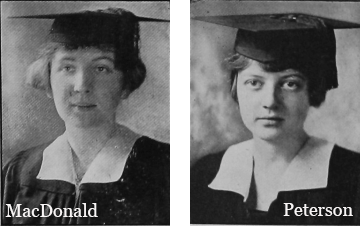Abstract
In a joint interview, classmates Edna Ruth MacDonald and Ruth Dorothea Peterson speak on the academic atmosphere at Pembroke College and the heavy constraints placed on women’s conduct and careers in the early 1900s. They begin by discussing their decisions to attend Pembroke, describing the expectation of college education their families had for them. MacDonald imagines that perhaps their mothers regretted getting married early and not going to college, and wanted something different for them. MacDonald and Peterson speak on the tremendous dropout rate of their class, with about half of the less than 100 women withdrawing from Pembroke during their course of study. They consider the strict division between the Brown and Pembroke campuses, and the disappointment of being prohibited from classes with certain professors and the imperative of being “seen not heard” for women in the academic world. They reflect on the limited career choices women had in 1919, and the devaluing of women’s education and intellectual competency. The alumnae end their interview by describing how they adored college, and pointing to how far women have come.
Interviewed by Barbara Raab
Suggested Chicago style citation: MacDonald, Edna Ruth and Peterson, Ruth Dorothea. Interview. By Barbara Raab. Pembroke Center Oral History Project, Brown University.
Biography
Edna Ruth MacDonald grew up in Providence and attended high school in East Providence. As the oldest child in her family, she had freedom in choosing her college. Her family always expected that she would pursue a higher degree after high school, and she attended Pembroke College at Brown University as part of the Class of 1919. After graduating with an A.B. from Brown, she was a counselor at Hope High School.
Ruth Dorothea Peterson grew up on Williams Street in Providence. An only child, she was always expected to attend college after high school. She had attended events at Brown University throughout her life, and Pembroke College was a natural choice for her. She graduated from Brown with an A.B. as part of the Class of 1919.
